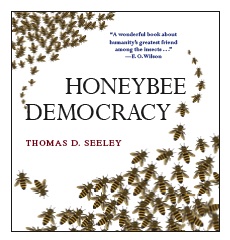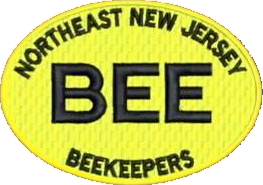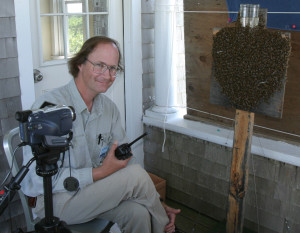Tired of the elections? Well find out how the bees do it. On Nov. 18 at 7:30 p.m. the Northeast New Jersey Beekeepers Association welcomes Dr. Tom Seeley, professor in Biology, in the Department of Neurobiology and Behavior at Cornell University, Ithaca, NY and the author of Honeybee Democracy.
His scientific work has primarily focused on understanding the phenomenon of swarm intelligence (SI): the solving of cognitive problems by a group of individuals who pool their knowledge and process it through social interactions. It has long been recognized that a group of animals, relative to a solitary individual, can do such things as capture large prey more easily and counter predators more effectively. More recently it has been realized that a group of animals, with the right organization, can also solve cognitive problems with an ability that far exceeds the cognitive ability of any single animal, said Seeley.
Since 1995, Seeley has concentrated on figuring out how a swarm of honey bees chooses a new home. This problem arises when a colony reproduces and the old queen bee and some ten thousand worker bees leave the parental hive to produce a daughter colony. The emigrating bees settle on a tree branch in a beard-like cluster and then hang out there together for several days. During this time, these homeless insects do something truly amazing: they hold a democratic debate to choose their new living quarters. Exactly how they do so is reviewed in his book Honeybee Democracy.
According to Seeley, the analyses of collective decision-making by honeybee colonies indicate that a group will possess a high level of SI if among the group’s members there is:
1) diversity of knowledge about the available options,
2) open and honest sharing of information about the options,
3) independence in the members’ evaluations of the options,
4) unbiased aggregation of the members’ opinions on the options, and
5) leadership that fosters but does not dominate the discussion.
At present, his main research interest is in the area of conservation biology: determining how honey bee colonies living in the wild are able to survive without being treated with pesticides for controlling a deadly ectoparasitic mite, Varroa destructor. Understanding how feral honey bee accomplish this will help beekeepers develop sustainable, pesticide-free approaches to beekeeping.His book Following the Wild Bees covers this topic.

Two of Seeley’s books will be available for sale at the meeting: The Honey Bee Democracy and his new book Following the Wild Bees. After the presentation, Dr. Seeley will be glad to autograph these and other books.
We will be meeting on the Ramapo College Campus in the H-Wing Auditorium at 7:30. Ramapo College is located at 505 Ramapo Valley Road, Mahwah, NJ

